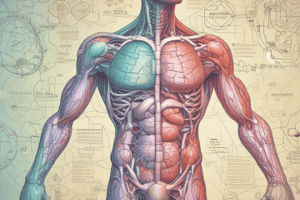Podcast
Questions and Answers
What is glycogen?
What is glycogen?
A polymer of glucose molecules used to store glucose.
Why is it important to store glucose? (Select all that apply)
Why is it important to store glucose? (Select all that apply)
- The brain always needs glucose to function (correct)
- Glucose can generate ATP without oxygen (correct)
- Glycogen can be rapidly broken down in times of increased activity (correct)
- None of the above
Where is glycogen stored? (Select all that apply)
Where is glycogen stored? (Select all that apply)
- Adipose tissue
- Liver for body use (correct)
- Bloodstream
- Muscles for muscle use (correct)
How is glycogen stored?
How is glycogen stored?
Describe the structure of glycogen. (Select all that apply)
Describe the structure of glycogen. (Select all that apply)
Describe the polarity of glycogen.
Describe the polarity of glycogen.
Does making glycogen cost energy?
Does making glycogen cost energy?
Describe the process of synthesizing a glycogen chain (not the branch part).
Describe the process of synthesizing a glycogen chain (not the branch part).
What is the major regulatory enzyme of glycogen synthesis?
What is the major regulatory enzyme of glycogen synthesis?
How are branched chains of glycogen formed?
How are branched chains of glycogen formed?
What is the result of adding a branch to a glycogen chain?
What is the result of adding a branch to a glycogen chain?
Describe glycogen breakdown (not debranching).
Describe glycogen breakdown (not debranching).
Where does glycogen phosphorylase stop?
Where does glycogen phosphorylase stop?
Does the phosphorylation of glucose in glycogen breakdown require ATP?
Does the phosphorylation of glucose in glycogen breakdown require ATP?
Describe debranching.
Describe debranching.
What are the fates of glucose-6-phosphate? (Select all that apply)
What are the fates of glucose-6-phosphate? (Select all that apply)
Flashcards are hidden until you start studying
Study Notes
Glycogen Overview
- Glycogen is a polymer of glucose molecules, serving as a storage form of glucose in the body.
- Essential for providing immediate energy, particularly for the brain and during physical activity.
Storage of Glycogen
- Stored in muscles for muscle-specific use and in the liver for distribution throughout the body.
- Stored in large granules within the cytosol of cells, featuring highly branched glucose polymers.
Structure of Glycogen
- Contains chains consisting of 12-14 glucose units linked by α(1→4) glycosidic bonds.
- Branch points occur at the 5th or 6th glucose unit, linking two chains through α(1→6) bonds.
- Each chain typically possesses two branch points, giving glycogen a curved structure due to its linkages.
Polarity and Energy Cost
- Characterized by a free anomeric carbon (reducing end) and a free 4'OH (non-reducing end).
- Synthesizing glycogen requires energy, indicated by ATP expenditure.
Glycogen Synthesis Process
- Glucose-6-phosphate is converted to glucose-1-phosphate by phosphoglucomutase.
- UDP-glucose is formed from glucose-1-phosphate and UTP, releasing pyrophosphate.
- Pyrophosphate is irreversibly hydrolyzed, ensuring the synthesis process's irreversibility.
- Glycogen synthase transfers glucose from UDP-glucose to the non-reducing end of glycogen, elongating the chain.
Regulation and Branching
- Major regulatory enzyme for glycogen synthesis is glycogen synthase.
- Branching enzymes create branches by transferring a segment of 7 glucose residues from an outer chain to another chain, producing α(1→6) linkages.
Impact of Branching on Glycogen
- Addition of branches enhances glycogen's water solubility and increases the number of reducing ends for metabolism.
Glycogen Breakdown Process
- Glycogen phosphorylase catalyzes the phosphorolysis of glycogen, yielding glucose-1-phosphate and a shorter glycogen chain.
- This process does not utilize ATP, as the phosphorylation of glucose occurs by adding inorganic phosphate (Pi).
Stopping Points and Debranching
- Glycogen phosphorylase halts four residues before a branch point during breakdown.
- Debranching involves a transferase shifting three residues from one branch to another and cleaving the remaining glucose through α1,6-glucosidase, yielding free glucose.
Fates of Glucose-6-Phosphate
- Can enter glycolysis for energy production in muscles.
- Cleaved by glucose-6-phosphatase in the liver to release free glucose into the bloodstream.
- Can also enter the pentose phosphate pathway to generate ribose and NADPH for various cellular processes.
Studying That Suits You
Use AI to generate personalized quizzes and flashcards to suit your learning preferences.





